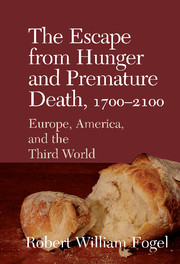Book contents
- Frontmatter
- Contents
- List of Figures
- List of Tables
- Preface
- Acknowledgments
- 1 The Persistence of Misery in Europe and America before 1900
- 2 Why the Twentieth Century Was So Remarkable
- 3 Tragedies and Miracles in the Third World
- 4 Prospects for the Twenty-First Century
- 5 Problems of Equity in Health Care
- Postscript: How Long Can We Live?
- Appendix
- Notes
- Glossary of Technical Terms
- Biographical Notes
- References
- Index
- Cambridge Studies in Population, Economy and Society in Past Time
5 - Problems of Equity in Health Care
Published online by Cambridge University Press: 05 June 2012
- Frontmatter
- Contents
- List of Figures
- List of Tables
- Preface
- Acknowledgments
- 1 The Persistence of Misery in Europe and America before 1900
- 2 Why the Twentieth Century Was So Remarkable
- 3 Tragedies and Miracles in the Third World
- 4 Prospects for the Twenty-First Century
- 5 Problems of Equity in Health Care
- Postscript: How Long Can We Live?
- Appendix
- Notes
- Glossary of Technical Terms
- Biographical Notes
- References
- Index
- Cambridge Studies in Population, Economy and Society in Past Time
Summary
In the United States and around the world, concern is growing about who gets health care. Individuals from different socioeconomic backgrounds face distressingly different prospects of living a healthy life. As numerous studies confirm, the disparities in various measures of health between the privileged and the deprived still remain wide, even in rich countries, despite the long-term tendency toward a healthier society.
Some investigators believe that the disparities are actually increasing. They suggest that the shift in the health care system in advanced industrial countries from the principle of universal access to a more market-oriented system may be one cause of the growing disparities they observe; rising income inequality is another potential culprit.
Policy makers worldwide meanwhile speak of more efficiently delivering “essential” health care, but nobody is certain what this means in practice.
What counts as essential in health care? What is the optimal mix of private and government components of health care services? To answer these questions, it is necessary to confront the question of how to define essential health care and then explore the policy implications of the analysis.
Standards for Rationing
International organizations such as WHO and the OECD have called on all countries to guarantee delivery of “high-quality essential care to all persons, defined mostly by criteria of effectiveness, cost and social acceptability.” Cost has become a controlling issue since the health care systems established in most OECD countries after World War II, which sought to guarantee complete health care for all through government-run health or insurance systems, have become so expensive that they now threaten the fiscal stability of governments.
- Type
- Chapter
- Information
- The Escape from Hunger and Premature Death, 1700–2100Europe, America, and the Third World, pp. 96 - 107Publisher: Cambridge University PressPrint publication year: 2004



